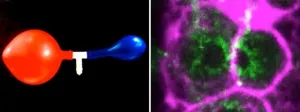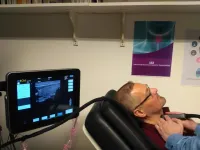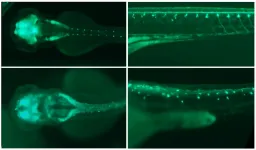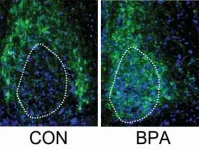Hydraulic instability decides who's to die and who's to live
Dresden researchers discover that a mechanical cue is at the origin of cell death decision
2021-06-01
(Press-News.org) In past studies, researchers have found that C. elegans gonads generate more germ cells than needed and that only half of them grow to become oocytes, while the rest shrinks and die by physiological apoptosis, a programmed cell death that occurs in multicellular organisms. Now, scientists from the Biotechnology Center of the TU Dresden (BIOTEC), the Max Planck Institute of Molecular Cell Biology and Genetics (MPI-CBG), the Cluster of Excellence Physics of Life (PoL) at the TU Dresden, the Max Planck Institute for the Physics of Complex Systems (MPI-PKS), the Flatiron Institute, NY, and the University of California, Berkeley, found evidence to answer the question of what triggers this cell fate decision between life and death in the germline.
Prior studies revealed the genetic basis and biochemical signals that drive physiological cell death, but the mechanisms that select and initiate apoptosis in individual germ cells remained unclear. As germ cells mature along the gonad of the nematode, they first collectively grow in size and in volume homogenously. In the study just published in Nature Physics, the scientists show that this homogenous growth suddenly shifts to a heterogenous growth where some cells become bigger and some cells become smaller.
The researcher Nicolas Chartier in the group of Stephan Grill, and co-first author of the study, explains: "By precisely analyzing germ cell volumes and cytoplasmic material fluxes in living worms and by developing theoretical modeling, we have identified a hydraulic instability that amplifies small initial random volume differences, which causes some germ cells to increase in volume at the expense of the others that shrink. It is a phenomenon, which can be compared to the two-balloon instability, well known of physicists. Such an instability arises when simultaneously blowing into two rubber balloons attempting to inflate them both. Only the larger balloon will inflate, because it has a lower internal pressure than the smaller one, and is therefore easier to inflate." This is what is at play in the selection of germ cells: such pressure differences tend to destabilize the symmetric configuration with equal germ cell volumes, so-called hydraulic instabilities, leading to the growth of the larger germ cell at the expense of the smaller one. By artificially reducing germ cell volumes via thermoviscous pumping (FLUCS method: focused-light-induced cytoplasmic streaming), the team demonstrated that the reduction in cell volumes leads to their extrusion and cell death, indicating that once a cell is below a critical size, apoptosis is induced and the cell dies.
By using confocal imaging, the researchers could image the full organism of the living worm to receive a global and precise picture of the volumes of all the gonad cells, as well as the exchange of fluids between the cells. Stephan Grill, Speaker of the Cluster of Excellence Physics of Life (PoL) and supervisor of the multidisciplinary work, adds "These findings are very exciting because they reveal that the life and death decision in the cells is of mechanical nature and related to tissue hydraulics. It helps to understand how the organism auto-selects a cell that will become an egg. Furthermore, the study is another example of the excellent cooperation between biologists, physicists and mathematicians in Dresden."
INFORMATION:
Original publication:
Nicolas T. Chartier, Arghyadip Mukherjee, Julia Pfanzelter, Sebastian Fürthauer, Ben T. Larson, Anatol W. Fritsch, Rana Amini, Moritz Kreysing, Frank Jülicher & Stephan W. Grill: "A hydraulic instability drives the cell death decision in the nematode germline", Nature Physics, 20 May 2021, doi: https://doi.org/10.1038/s41567-021-01235-x
[Attachments] See images for this press release:

ELSE PRESS RELEASES FROM THIS DATE:
2021-06-01
Researchers from Trinity College Dublin have developed a novel set of tools for designing vitamin D clinical trials that capture large seasonal and population-wide differences in vitamin D status, typically seen in individuals. Their study published in the journal Scientific Reports (today, Monday 31st May 2021) provides a framework for clinical trials to establish whether vitamin D supplementation is effective against a given disease.
The study also reveals that many trials which failed to find any association between vitamin D and disease prevention may have been underpowered or conducted without enough subjects to detect a benefit of vitamin D.
You can read the full journal paper here: https://go.nature.com/3uERjgO
The ...
2021-06-01
YouTube is a treasure trove of virtual reality fails: users tripping, colliding into walls and smacking inanimate and animate objects. By investigating these "VR Fails" on YouTube, researchers at the University of Copenhagen have sought to learn more about when and why things go sideways for users and how to improve VR design and experiences so as to avoid accidents.
Millions of YouTube viewers have enjoyed hearty laughs watching others getting hurt using virtual reality - people wearing VR headsets, falling, screaming, crashing into walls and TV sets, or knocking spectators to the floor. Some of us have even been that failing someone. Now, videos of virtual reality mishaps, called "VR Fails", ...
2021-06-01
Redox-flow batteries store electrical energy in chemical compounds that are dissolved in an electrolyte. They are a particularly promising alternative to lithium-ion batteries as stationary energy storage. A team headed by Prof. Dr. Ingo Krossing from the Institute of Inorganic and Analytical Chemistry at the University of Freiburg has succeeded in developing a non-aqueous All-Manganese Flow battery (All-MFB) that uses sustainable manganese as its active material and has a long cycle life. The researchers present the results of their work in the latest edition of Advanced Energy Materials.
Active materials are ...
2021-06-01
Energy communities will play a key role in building the more decentralised, less carbon intensive, and fairer energy systems of the future. Such communities enable local prosumers (consumers with own generation and storage) to generate, store and trade energy with each other -- using locally owned assets, such as wind turbines, rooftop solar panels and batteries. In turn, this enables the community to use more locally generated renewable generation, and shifts the market power from large utility companies to individual prosumers.
Energy community projects often involve jointly-owned assets such as community-owned wind turbines or shared battery storage. Yet, this raises the question of how these assets should be controlled - often in real time, and how the energy outputs jointly-owned ...
2021-06-01
Thyroid nodules are a common pathology having a prevalence of 19-76% when screened with ultrasound, with higher frequencies in women. Current medical methods used to assess the malignancy of a nodule consist in performing an ultrasound, followed by a Doppler ultrasound, and then a biopsy. However, unfortunately, these methods present both low specificity and low sensitivity. This insufficient effectiveness in accurately being able to diagnose thyroid tumors leads to many unclear or unnoticed cases as well as many others that undergo unnecessary surgeries (false positives) and increase the cost ...
2021-06-01
When the Augustinian monk Gregor Mendel crossed white-flowering with purple-flowering pea plants in the mid-19th century, he made an interesting discovery: The offspring were all purple. He therefore called this trait dominant, while the white blossom color was recessive. The reason for this phenomenon: In peas, each gene occurs twice. One version comes from the maternal plant and the other from the paternal plant. If a pea has inherited the gene for purple flower color from one parent, but the gene for white flower color from the other, purple wins. Only when two genes for white flowers come together in the offspring plant is it white.
Humans also have genes that are inherited either dominantly or recessively. However, the case is not so clear for the mutations investigated ...
2021-06-01
Using a Fitbit and a spy mic, scientists have discovered new insight into the behaviour of the elusive Canada lynx. A new study by researchers from McGill University, University of Alberta, and Trent University provides a first look at how miniaturized technology can open the door to remote wildlife monitoring.
"Working on one of the boreal forest's top predators, the Canada lynx, we found that two different technologies, accelerometers and audio recording devices, can be used to remotely monitor the hunting behaviour of predators, even documenting the killing of small prey," says lead author Emily Studd, a Postdoctoral Fellow under the supervision of Murray Humphries at McGill University and Stan Boutin at University ...
2021-06-01
The University of Ottawa's Positive Energy program released new survey results showing that a large segment of the Canadian public does not trust the courts to settle disputes over energy projects or climate policy. The survey was conducted by Positive Energy's official pollster, Nanos Research.
Canadians were asked: On a scale of 0 to 10, where 0 means do not trust at all and 10 means trust completely, how much do you trust the courts to settle disputes over government decisions on energy projects? They were asked the same question for climate policy. The results are very similar. Only one in three Canadians trust the courts to settle disputes over energy projects or climate policy (answering between 7 and 10: 31% for energy, 30% for ...
2021-06-01
Machine learning, when used in climate science builds an actual understanding of the climate system, according to a study published in the journal Chaos by Manuel Santos Gutiérrez and Valerio Lucarini, University of Reading, UK, Mickäel Chekroun, the Weizmann Institute, Israel and Michael Ghil, Ecole Normale Supérieure, Paris, France. This means we can trust machine learning and further its applications in climate science, say the authors. The study is part of the European Horizon 2020 TiPES project on tipping points in the Earth system. TiPES is administered from the University of Copenhagen, Denmark.
Man or ...
2021-06-01
Humans are exposed to a bath of chemicals every day. They are in the beds where we sleep, the cars that we drive and the kitchens we use to feed our families. With thousands of chemicals floating around in our environment, exposure to any number is practically unavoidable. Through the work of researchers like Dr. Deborah Kurrasch, PhD, the implications of many of these chemicals are being thoroughly explored.
"Manufacturers follow standards set by regulatory bodies, it's not up to the manufacturers to prove the chemicals in consumer products are safe," says Kurrasch, a researcher in the University of Calgary's Hotchkiss Brain ...
LAST 30 PRESS RELEASES:
[Press-News.org] Hydraulic instability decides who's to die and who's to live
Dresden researchers discover that a mechanical cue is at the origin of cell death decision








